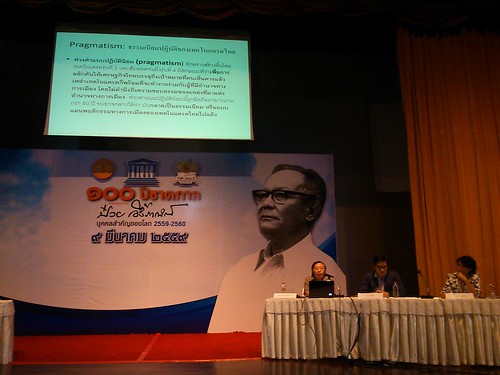According to education expert Vachararutai Boontinand the current Thai education system is failing to foster active citizens under Thailand’s democratic system of governance despite attempts to implement democratic principles into school curriculums,
On Wednesday, 9 March 2016, Thammasat University’s Tha Prachan Campus organised a centennial anniversary event to honor Puey Ungphakorn, a late former rector of Thammasat University and governor of the Central Bank of Thailand, renowned for his role in the development of Thai politics and economy.
Referred to by many as an ‘incorruptible’ statesman, the 6 October 1976 student massacre spurred Puey into self-imposed exile to the United Kingdom. Soon after the massacre, Puey resigned from his post as Thammasat University’s rector in protest of the bloodbath.
The anniversary event included the launch of a new book written by the country’s leading academics titled ‘Puey and the Thai Society in Transition.’ The book details the legacies of Puey’s work in relation to human rights, democracy, economy, and education in Thailand as well as provides the viewpoints of his critics.
When considering the impact of Puey’s legacy on Thailand’s education, Vachararutai Boontinand, an expert from the Institute of Human Rights and Peace Studies of Mahidol University, who authored a chapter in the book titled ‘Education and the Creation of Democratic Citizenship: Development and Challenges of Thailand,’ pointed out that regardless of attempts to promote democratic principles in school pedagogies, the country has failed to cultivate active democratic citizenship.

A discussion at Thammasat University, Tha Prachan Campus, on 9 March 2016, at the centennial anniversary of Puey Ungphakorn
During the 9 March 2016 discussion at Thammasat University’s Tha Prachan Campus, Vachararutai highlighted that, in theory, the primary reason for a state to provide public education is to foster the sense of citizenship in order to serve the purpose of the nation state. Therefore, civic duty or citizenship classes are implemented in various countries.
There are many theories on the creation of democratic citizenship, and it is still a widely debatable concept as to what type of characteristics make up an active democratic citizen, said Vachararutai.
In regard to Puey and education, Vachararutai continued that “Puey’s thoughts on [democratic] citizenship can be divided into two major categories; participative citizens who have rights and liberties and citizens who also possess responsibility and moral principles, which are all connected with democracy and justice.”
Vachararutai’s in-depth study of the pedagogies of civic education lessons over various semesters at the primary and secondary level of Thai public schools, revealed that Thai education tends to focus heavily on how to created ‘good people’, stressing the quality of being good, disciplined, docile, loyal, united, and possessing high morals.
When the pedagogies were revised and updated in 2001 and 2008, concepts such as participation of citizens, respect of the rule of law, and conflicts in the society were added. Yet, the pedagogies continued to emphasize the importance of Thai cultures and traditions, such as respect towards elders or one role and duties of individuals based on their occupations and family lineage, Vachararutai analysed.
“It seems that there are two contradictory themes of the pedagogies one of which is the international principles of [democratic citizen] and the Thai one stressing on cultures and traditions,” Vachararutai articulated.
She further revealed a specific case study in her research where a school was a three time winner of an award by the National Identity Commission as a model school for promoting democracy. While the school allowed for open elections for the student body to elect its student council members, the student council was not endowed with opportunities to effectively participate in school affairs, but rather served as the eyes and ears for teachers.
While alternative Thai schools might allow more freedom for students to interact with teachers, seniority and hierarchy are still respected by students in general.
In terms of tertiary level of education, Vachararutai stated that there are no mandatory civic duty or citizenship classes. However, in the recent decade, certain universities, such as Thammasat University has introduced general education courses, for example, TU100 class which was opened in 2011.
These tertiary level classes are successful in creating active democratic citizens to a certain extent. However, the learning dimensions are mostly confined to the individual level rather than providing constructive tools for students to understand underlying structural problems of societies.
As Thai society and its socio-economic structures get more complex and inequality continues to rise, Vachararutai urged that the Thai education system, especially at the primary and secondary level, should provide analytical tools for youths to better understand the root problems of the country’s politics and economy. Armed with this knowledge, they will be capable of engaging as active democratic citizens, resulting in a more just society for all Thais.
Prachatai English is an independent, non-profit news outlet committed to covering underreported issues in Thailand, especially about democratization and human rights, despite pressure from the authorities. Your support will ensure that we stay a professional media source and be able to meet the challenges and deliver in-depth reporting.
• Simple steps to support Prachatai English
1. Bank transfer to account “โครงการหนังสือพิมพ์อินเทอร์เน็ต ประชาไท” or “Prachatai Online Newspaper” 091-0-21689-4, Krungthai Bank
2. Or, Transfer money via Paypal, to e-mail address: [email protected], please leave a comment on the transaction as “For Prachatai English”
